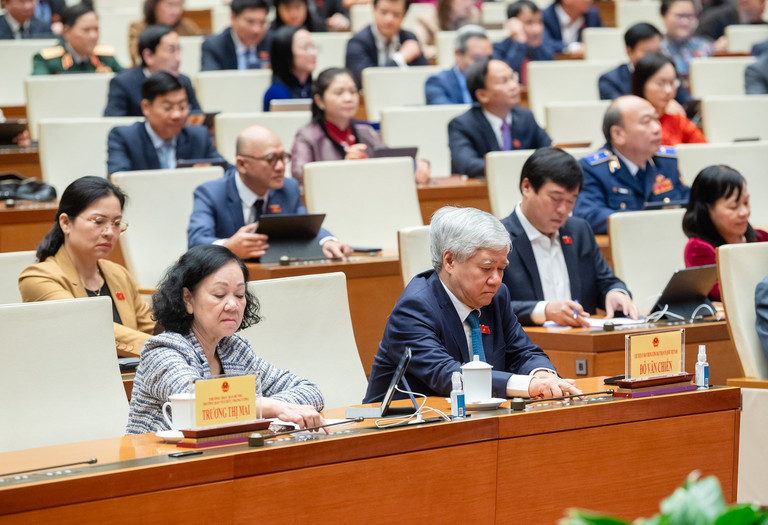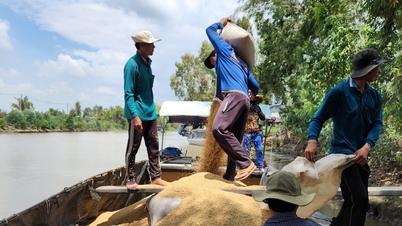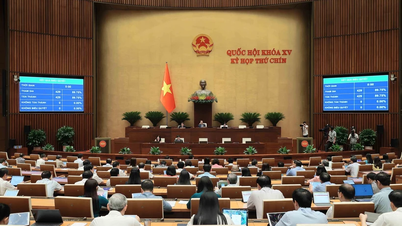The Law on Credit Institutions (amended) consists of 15 chapters and 210 articles (compared to the draft Law submitted to the National Assembly at the 6th Session, 4 articles are removed, 11 articles are added, 15 articles are kept the same and other articles are technically revised).
In particular, the Law drafting agency has received opinions from National Assembly deputies on many contents: explanation of terms; policy banks; standards and conditions for managers, operators and some other positions of credit institutions, control boards; independent audit; operations of credit institutions; credit limits; finance, accounting, bookkeeping...
Add some groups of people related to TCTD
Before the National Assembly deputies voted to approve, a number of major issues of the draft Law were reported and discussed, including: Risk provisions; Early intervention in credit institutions and foreign bank branches; Special control of credit institutions; Handling cases of mass withdrawals, special loans and lending from credit institutions; Handling of bad debts and secured assets; State management agencies; Implementation provisions.
Some new points of the Law include: adding Chapter II on policy banks; moving the Chapter on handling bad debts and collateral of bad debts before the Chapter on restructuring, dissolution, and bankruptcy. At the same time, the Chapter on special control, compulsory transfer, and bankruptcy of credit institutions under special control is divided into 2 chapters: (i) Handling cases of credit institutions suffering from mass withdrawals (Chapter XI); (ii) Special borrowing and lending (Chapter XII).

Among the proposed contents to continue to be amended and supplemented in the draft Law on Credit Institutions (amended), the provisions on related persons, the provisions related to the processing of personal data and the consolidation of the License for establishment and operation of credit institutions are also prominent and noteworthy contents.
To ensure safety in the operations of credit institutions, transparency in the ownership of shares by shareholders and those related to those shareholders, and limit the manipulation of the operations of credit institutions, the draft Law adds a number of related groups of people including: (i) “subsidiaries of subsidiaries of credit institutions; (ii) paternal grandparents, maternal grandparents, paternal grandchildren, maternal grandchildren, aunts, uncles, paternal uncles, paternal nieces, paternal aunts, paternal uncles, paternal aunts, paternal uncles and vice versa”; more clearly defining the individuals authorized to represent organizations and individuals as individuals authorized to represent capital contributions for organizations and individuals. The above provisions have ensured clarity in identifying related people in the draft Law.
However, for People's Credit Funds, it is proposed not to apply the provisions at Point a, e, Clause 32, Article 4 of the Draft Law because in reality, the scale of outstanding credit balance of customers who are legal entities accounts for a small proportion in the total outstanding debt structure of the fund.
At the same time, for related persons who are individuals of the People's Credit Fund at Point d, Clause 32, Article 4, the current Law remains unchanged, only including "Individuals with the wife, husband, father, mother, children, brothers, sisters of this person".
Reduce licensing procedures
The State Bank said that the implementation of business registration and operation registration at the Business Registration Agency as currently prescribed in the Law on Credit Institutions is essentially also a procedure for the Business Registration Agency to update information and data to the National Information System on Business Registration for management purposes.
The entire process of checking, approving conditions for granting, amending and supplementing licenses has been carried out by the management agency, the State Bank.
Therefore, the procedures for business registration and operation registration at the Business Registration Office after completing the procedures for requesting the issuance, amendment, and supplementation of licenses at the State Bank are duplicated, increasing costs for state management agencies, credit institutions, and the whole society.
Therefore, the regulation on the consolidation of the License for establishment and operation of a credit institution and the Certificate of Business Registration in the draft Law is a breakthrough in reducing administrative procedures for enterprises, in line with the general policy of the Government , significantly reducing the time and costs that the Business Registration Authority and credit institutions must use resources to carry out business registration and operation registration procedures, creating a more favorable investment environment for enterprises.
Previously, based on the opinions of National Assembly deputies, the National Assembly Standing Committee directed the agency in charge of the review, the drafting agency and relevant agencies to study, absorb and revise the draft Law to ensure prudence, thoroughness, and adherence to the requirements of restructuring, enhancing the capacity and efficiency of the credit institution system in accordance with the Party's policies and the National Assembly's resolutions.
On January 16, the Government issued Report No. 18/BC-CP on opinions on receiving, explaining, and revising the draft Law.
Source






![[Photo] Prime Minister Pham Minh Chinh and Prime Minister of the Kingdom of Thailand Paetongtarn Shinawatra attend the Vietnam-Thailand Business Forum 2025](https://vphoto.vietnam.vn/thumb/1200x675/vietnam/resource/IMAGE/2025/5/16/1cdfce54d25c48a68ae6fb9204f2171a)































![[Photo] President Luong Cuong receives Prime Minister of the Kingdom of Thailand Paetongtarn Shinawatra](https://vphoto.vietnam.vn/thumb/1200x675/vietnam/resource/IMAGE/2025/5/16/52c73b27198a4e12bd6a903d1c218846)




























































Comment (0)